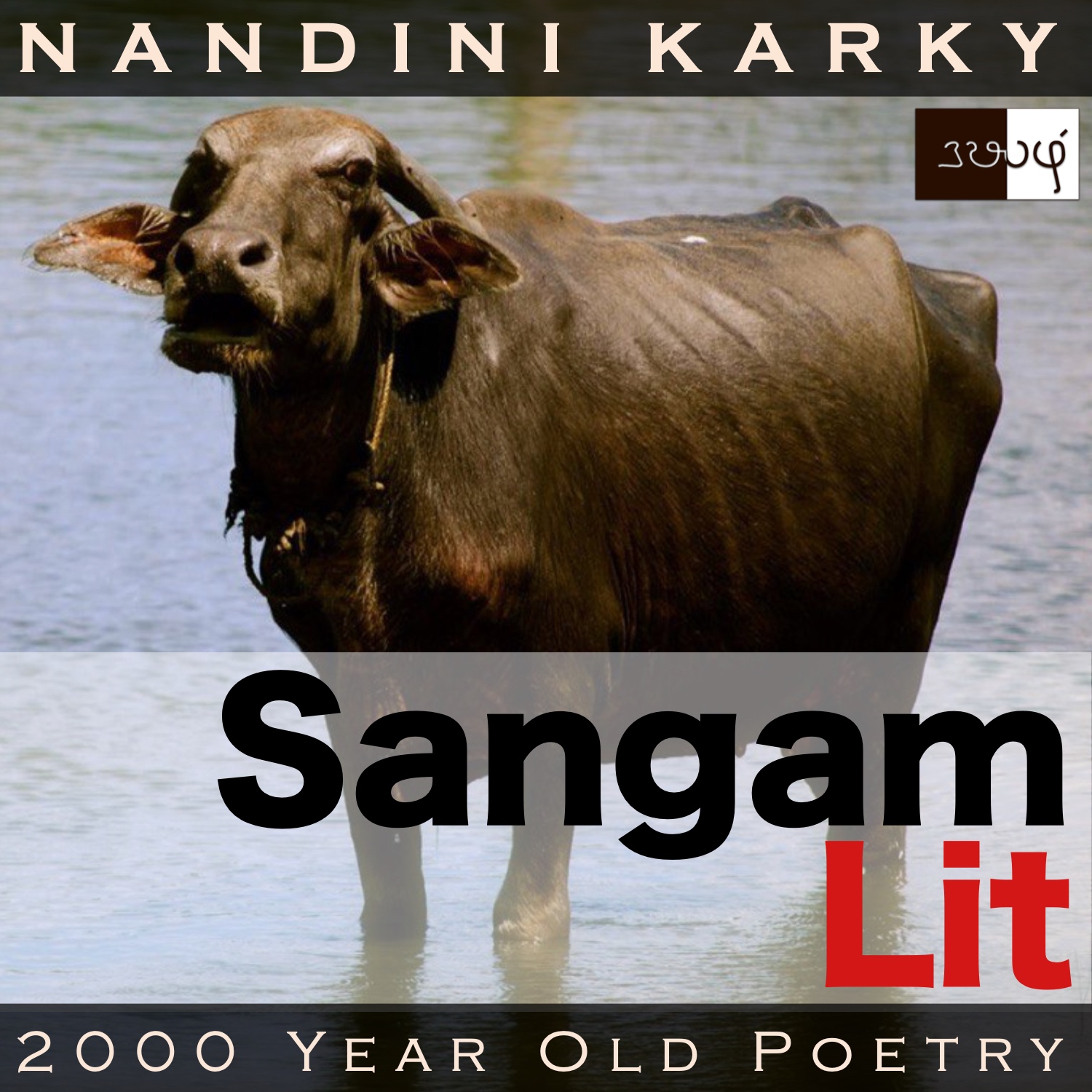Podcast: Play in new window | Download
Subscribe: Apple Podcasts | Spotify | Amazon Music | Android | iHeartRadio | TuneIn | RSS | More

In this episode, we reflect on a deep truth depicted in Sangam Literary work, Natrinai 80, written by Poothan Thevanaar. Set in the agricultural landscape of ‘Marutham’, the poem speaks in the voice of the man to his heart, passing on a pointed message to the confidante, listening nearby.
‘மன்ற எருமை மலர் தலைக் காரான்
இன் தீம் பாற்பயம் கொண்மார், கன்று விட்டு,
ஊர்க் குறுமாக்கள் மேற்கொண்டு கழியும்
பெரும் புலர் விடியலின் விரும்பிப் போத்தந்து,
தழையும் தாரும் தந்தனன், இவன்’ என,
இழை அணி ஆயமொடு தகு நாண் தடைஇ,
தைஇத் திங்கள் தண் கயம் படியும்
பெருந் தோட் குறுமகள் அல்லது,
மருந்து பிறிது இல்லை, யான் உற்ற நோய்க்கே.
The moment I read the first two words, I burst out laughing. The word ‘எருமை’ meaning ‘buffalo’ is the one to be blamed! The comic turn of this word in contemporary lingo never fails to tickle me, even though in the Sangam age, this reference was actually an admiring epithet for wealth and prosperity. Talking about the way words change, I was amazed to find the word ‘மன்றம்’, currently used to mean an ‘assembly’, meaning a ‘buffalo shed’ in the past! The ‘பயம்’ we meet in ‘பாற்பயம்’ is not ‘fear’ as we may assume, but ‘use’, more specifically, ‘the use of milk’. The phrase ‘ஊர்க் குறுமாக்கள் மேற்கொண்டு’ brings to mind, little boys in the village, acting as cowherds, climbing on the gentle buffaloes and smiling like little devils. A melodious song caresses our ears as we read the rhythmic ‘தழையும் தாரும் தந்தனன், இவன்!’
Moving from melody to meaning, we learn that the confidante has been disrupting the love relationship between the man and the lady, by not letting the man near her friend. She does this, perhaps to turn his heart towards a formal union. The man, is understandably distressed by the actions of the confidante. So, one morning, when he meets the lady and her friends, making sure the confidante is in earshot, he says to his heart, “Desiring the sweet milk of the female buffalo, with a wide-open, flower-like head, the town’s little boys, leave the calf back home and climb on the beast, steering it towards the fields at the time when dawn rises, slaying darkness. At that time of dawn on a day in the month of Thai, the lady arrives with her bejewelled playmates to bathe in the cool pond. Just then, she remembers me thinking ‘he was the one who gave these garlands and leaves’. As she dwells on it, she’s filled with shyness and she hides it from those around her. There’s no other medicine for the disease that afflicts me other than that bathing, young maiden with wide shoulders.” With these words, the man stresses the lady’s love for him to the confidante and also, passes on a hidden message to tame the confidante’s mind and align it to his wishes.
Buffaloes and bathing belles! Let’s take a dip in this pond of poetry to unravel the intricacies depicted. The scene in the natural world opens with a female buffalo being driven away from its calf by little boys, who intend to gather and use the buffalo’s sweet milk. The time of day when this happens is the connecting link in the verse. When the sun’s rays spread in the sky and paint it in a gush of red and orange, it’s then these boys seem to take the buffalo away. At the same time of day in the month of Thai, the scene involving the lady is presented. Turning our attention to the ‘தைஇத் திங்கள்’ or ‘a day in the month of Thai’, we find that it signifies a custom in ancient Tamil culture, wherein girls had the practice of bathing in the waters of a river/pond in the month of ‘Thai’. This month falls at a time when the rains are just done with and fresh water seems to be bubbling in all the water bodies. More importantly, it could be quite possible that being winter, the water may be warmer than the cold air around. So, there could be many reasons for this custom, maybe even plain, old common sense! But, as religion gained a stronger hold, such cultural practices took on a religious flavour, portraying this custom as one, wherein unmarried girls pray for a good husband to the gods and goddesses. However in this case, seeing the words ‘மருந்து’ and ‘நோய்’ in close association, I identify this custom more as a health cure and perhaps, a celebration of nature.
Another interesting reference is that the most wondrous of gifts that a man could give his lady was just leaves and garlands. What a gloriously simple life! All the man had to do was gather the leaves and flowers that bloomed all around and give it to his girl and seems like she would be bowled over. By expressing what’s in the mind of his lady, the man hints to the confidante how much he means to the lady. In addition, with that metaphor of a buffalo being taken away from its calf, he relates that the confidante too is trying to take the lady away from him so that the sweet milk of a formal union shall be attained. He puts himself in the place of that distressed calf away from its mother and says the only cure for him is to be with his lady. Is it right that the buffalo be separated from its calf? The milk gushes to feed its young one but the world has other plans for it. With these words, the man indeed makes us ponder on how we humans have bent the natural world to fit in the mould of our own whims and fancies!




Gloriously simple life 😊 – Love this phrase ❤️